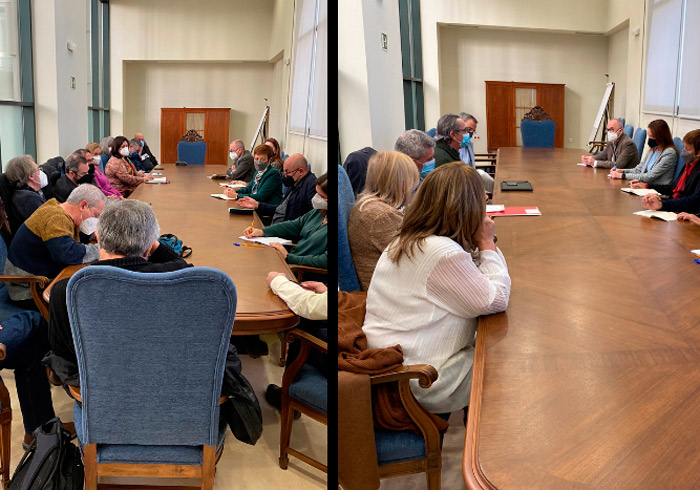
Through participatory dialogue, Mavi Mestre, candidate for Principal of the Universitat de València, and her team held meetings with the Unión General de Trabajadores, UGT, and with Comisiones Obreras to discuss the needs of teaching and research staff and administrative and service staff.
On the mornings of 17th and 22nd February, as part of the electoral campaign, the candidate for Principal of the Universitat de València, Mavi Mestre, held meetings with representatives of the Unión General de Trabajadores and Comisiones Obreras to address issues related to the institutional needs and demands of the different sectors of the University.
Besides the candidate, the University's management team included Ernest Cano (Vice-Principal for Teaching Staff and Academic Planning); Ángeles Solanes (who will be Vice-Principal for Teaching Transformation and Continuous Learning); and Helena Rausell (who will be in charge of Equality, Diversity and Inclusive Policies), as well as the University's General Manager, Juan Vicente Climent.
Those present stressed the need to tackle the budgetary problems facing the University, the demand for immediate authorisation from the Council for the signing of the staff’s collective agreement, as well as the need to negotiate working conditions to strengthen the recruitment of both Teaching and Research Staff and Administrative and Service Staff.
Moreover, in order to address the generation gap in public service and cover the staff shortage, measures were proposed for the integration of young staff into civil service. And satisfaction was expressed with the proposals to encourage good administrative and management practices regarding the consolidation of the professional career system, making university autonomy compatible with the functioning of internal promotion compliant with teaching and research merits.
Among other aspects, and given the needs that have arisen due to the health situation, the trade union agents expressed the convenience of reinforcing the medical service, the University's psychological care and the prevention and environment service with staff, so that demanding situations that occur in the university environment can be avoided and tackled strengthening the institution's plans and protocols.
Mention was also made of the reduction of working hours, as well as the revision of the functions catalogue for the restructuring and reinforcement of the units in matters of administrative organisation, aspects in which much progress was made during the first mandate of the team led by the candidate and in which progress can continue to be made.
One aspect on which they focused was the accreditation of research staff, its control by ANECA and possible transparency and supervision measures to improve the role of the evaluation bodies, a matter on which the Conferencia de Rectores de las Universidades Españolas (CRUE) is working.
On workload, the trade union representatives suggested that it would be appropriate to reduce the teaching staff’s bureaucratic activities and to recognise them, so that they can focus fundamentally on their research and teaching activities.
It was suggested that the figure of full-time trainee lecturer doctors should be reconsidered in cases where direct accreditation as full-time lecturers is available. Even though she fully agreed on the conveniences of the proposal, the candidate commented that it is a difficult measure to apply in the short term due to the replacement rate, given that full-time trainee lecturer doctors do not consume the replacement rate and full-time lecturer doctors do.
It was also proposed to equate the full-time lecturer doctor with the position of tenured university professor, a topic that seems to be contemplated in some drafts of the LOSU.
In view of the needs expressed, Mavi Mestre once again reflected on the economic and regulatory situation that the Universitat de València is going through, the limitations that constitute, among others, the replacement rate and the lack of a funding model for Valencian public universities, but pledged to analyse possible courses of action and to continue listening to proposals in order to find solutions.
She also informed the trade union representatives of the work being carried out by the Institution, together with the Ministry of Universities, to increase mental health assistance in the university community, with measures to prevent the pandemic effects.
She also insisted on her firm demand for university autonomy and her intention to obtain, despite all the obstacles, the budget required to improve the salaries of the Teaching and Research Staff and the Administrative and Service Staff and, in general, the University’s services.
Both the representatives of Unión General de Trabajadores and Comisiones Obreras congratulated the team led by Mavi Mestre for their work and agreed to continue meeting and working for the benefit of the university community. In the same way, the candidate for the principal of the University thanked the predisposition to dialogue of the trade union organisation and predicted many advances from the path of joint work.


